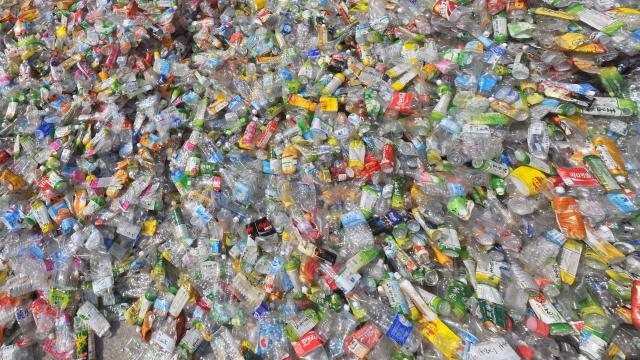Plastic producers have tried to make us think that individuals can solve pollution by improving our recycling and shopping habits. A new study makes it clear why that’s their tactic. Just 20 companies are responsible for more than half of the world’s trashed single-use plastic.
The Plastic Waste Makers Index, published Tuesday by the Australian foundation Minderoo, is a comprehensive account of the companies manufacturing plastic that goes into disposable products. It shows that energy giants and chemical conglomerates are among the 20 companies that created 55 per cent of global plastic waste. Expanding the view just a bit further, the report also shows that just 100 businesses account for more than 90 per cent of trashed plastic.
The top contributor to throwaway plastics, the report found, is Exxon. In 2019, it contributed 5.9 million metric tons of plastic that got thrown away. In close second and third were the world’s two largest chemical companies, U.S.-based Dow and China’s Sinopec. They created 5.5 million metric tons and 5.3 million metric tons of the stuff respectively.
The research also showed that recycled plastic account for just 2 per cent of the world’s disposable plastics. The vast majority are made from virgin materials, meaning new fossil fuels were extracted to create them.
Though the majority of the main producers are based in Asia, the report shows that those companies are fuelling throwaway lifestyles elsewhere. People in Australia and the U.S. produced the greatest amounts of plastic waste at more than 110 pounds (50 kilograms) per person. By contrast, the average person in China — the nation that produces the most single-use plastic by volume — creates just 40 pounds (18 kilograms) per year.
Curbing individual plastic use is nice. But the study makes clear that won’t solve the problem. The only way to end this cycle, the report makes clear, is to immediately and rapidly curb plastic production. Previous research has put together plans to do just that.
Failing to do so will worsen the plastic pollution crisis, which contributes to climate change and wreaks havoc on public health, especially in the communities of colour that production plants are often sited near. Sending single-use plastics to incinerators and landfills also creates toxic and planet-warming pollution. Meanwhile, the materials that don’t make it into incinerators or landfills end up polluting the world’s land and ocean ecosystems. The equivalent of one dump-truck load of plastic enters the ocean every minute. There, it kills wildlife, carries diseases, and releases carcinogenic pollutants.
But as of right now, the new study shows the world is moving in the wrong direction. “A 30 per cent increase in global throwaway plastic production is projected over the next five years,” the report said. “This growth in production will lead to an extra 3 trillion items of throwaway plastic waste by 2025 alone.”
To stave off worse impacts, we need to clamp down on the plastic producers who created this crisis and are perpetuating it rather than listening to calls for individual action alone. It’s their fault. Don’t let them tell you otherwise.
